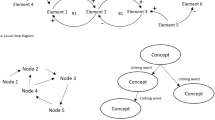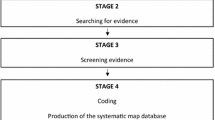Overview
- Authors:
-
-
Pete Barbrook-Johnson
-
School of Geography and the Environment, University of Oxford, Oxford, UK
-
Alexandra S. Penn
-
Department of Sociology, University of Surrey, Guildford, UK
Provides a practical and in-depth discussion of causal systems mapping methods
Provides guidance on running systems mapping workshops and using different types of data and evidence
Orientates readers to the systems mapping landscape and explores how we can compare, choose, and combine methods
This book is open access, which means that you have free and unlimited access
About this book
This open access book explores a range of new and older systems mapping methods focused on representing causal relationships in systems. In a practical manner, it describes the methods and considers the differences between them; describes how to use them yourself; describes how to choose between and combine them; considers the role of data, evidence, and stakeholder opinion; and describes how they can be useful in a range of policy and research settings. This book provides a key starting point and general-purpose resource for understanding complex adaptive systems in practical, actionable, and participatory ways. The book successfully meets the growing need in a range of social, environmental, and policy challenges for a richer more nuanced, yet actionable and participatory understanding of the world. The authors provide a clear framework to alleviate any confusion about the use of appropriate terms and methods, enhance the appreciation of the value they can bring, and clearly explain the differences between approaches and the resulting outputs of mapping processes and analysis.
Similar content being viewed by others
Article
Open access
04 May 2024
Article
Open access
26 April 2016
Table of contents (12 chapters)
-
Front Matter
Pages i-xvii
-
- Pete Barbrook-Johnson, Alexandra S. Penn
Pages 1-19Open Access
-
- Pete Barbrook-Johnson, Alexandra S. Penn
Pages 21-32Open Access
-
- Pete Barbrook-Johnson, Alexandra S. Penn
Pages 33-46Open Access
-
- Pete Barbrook-Johnson, Alexandra S. Penn
Pages 47-59Open Access
-
- Pete Barbrook-Johnson, Alexandra S. Penn
Pages 61-78Open Access
-
- Pete Barbrook-Johnson, Alexandra S. Penn
Pages 79-95Open Access
-
- Pete Barbrook-Johnson, Alexandra S. Penn
Pages 97-112Open Access
-
- Pete Barbrook-Johnson, Alexandra S. Penn
Pages 113-128Open Access
-
- Pete Barbrook-Johnson, Alexandra S. Penn
Pages 129-143Open Access
-
- Pete Barbrook-Johnson, Alexandra S. Penn
Pages 145-159Open Access
-
- Pete Barbrook-Johnson, Alexandra S. Penn
Pages 161-177Open Access
-
- Pete Barbrook-Johnson, Alexandra S. Penn
Pages 179-182Open Access
-
Back Matter
Pages 183-186
Authors and Affiliations
-
School of Geography and the Environment, University of Oxford, Oxford, UK
Pete Barbrook-Johnson
-
Department of Sociology, University of Surrey, Guildford, UK
Alexandra S. Penn
About the authors
Pete Barbrook-Johnson is a social scientist and complexity scientist working on a range of environmental and energy policy topics, using systems mapping, agent-based modelling, and other related approaches. He is a Departmental Research Lecturer at the University of Oxford and a member of the Centre for the Evaluation of Complexity Across the Nexus (CECAN).
Alexandra S. Penn is a complexity scientist working on combining participatory methodologies and mathematical models to create tools for stakeholders to understand and ‘steer’ their complex human ecosystems. She is a Senior Research Fellow at the University of Surrey and a member of the Centre for the Evaluation of Complexity Across the Nexus (CECAN).




